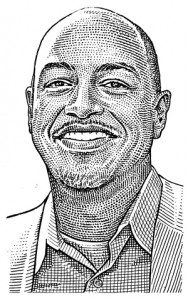I’m in Hong Kong with the Henry Center, my employer, as we’re hosting an international conference on evangelical identity. I’ll be blogging about the conference on the Henry Center blog and will cross-post here.
The conference has now started in earnest. We’re at the YMCA International House on Waterloo Street, right in the middle of bustling Hong Kong. Come join us if you’re up for the fifteen-hour flight.
This morning, historians Doug Sweeney of TEDS and Kevin Yao of China Graduate School of Theology discussed the nature of evangelical identity as related to history. Sweeney’s talk, “Modern Evangelicalism and Global Christian Identity: Promise and Peril as Seen Through the Eyes of a North American Church Historian”, surveyed definitions of evangelicalism, suggested one that emphasized the fact that evangelicalism is founded upon an eighteenth century “twist”, and then encouraged Christians of all stripes to simultaneously preserve the indigenous nature of the faith as expressed in their culture and to link arms with the global and historical church.
This was an important message for Christians of both East and West to hear. No group of Christians is immune to the danger of narrowed vision. Indeed, in America, we saw time and time again efforts and organizations pop up with great motives but no confessional and ecclesiastical connection. What great need, then, for Christians to simultaneously take the faith to their culture while connecting themselves, however awkwardly, to the church of all ages and cultures. Our faith must be both horizontal, linked to those who claim Christ across the world, and vertical, linked to the church of ages past and, God willing, of ages to come.
Yao gave a strong talk titled “Chinese Evangelicals and Social Concerns: A Historical and Comparative Review” on the nature of Chinese approach to government and society. Surveying the Christian heritage of China, he noted that in the past, believers took an apolitical position. Now, however, they are rethinking this position, and it seems best to Yao for the church to ” to witness to Christian faith through teaching basic Christian values, charity and dialogue with the authority.” I found this a provocative insight.
Following a panel discussion between Sweeney, Yao, and moderator Andrew Lam of Evangel Seminary, Old Testament scholars K. Lawson Younger of TEDS and Timothy Wu of China Evangelical Seminary spoke. Younger’s talk, “The Old Testament in its Cultural Context: Implications of “Contextual Criticism” for Chinese and North American Christian Identity”, propounded a forceful case for the need to analyze three primary environments in teaching and preaching the Scripture: literary (textual) environment, material cultural (archaeological) environment, and geographic (topological) environment. Younger gave examples of ways in which these methods buttressed and enhanced study of Scripture. Though the talk performed few exegetical feats, it gave a stirring call for close, careful study of the Bible. It is easy for students of God’s Word to get distracted by various disciplines and endeavors. Ideally, we should use philosophy, theology, history, and so on to enrich our study of the Word, but all our preaching and teaching should be founded upon an attempt to get to the very heart of the text.
I remember well a great lesson from a class on Isaiah at Southern Seminary. I wrote a long paper on chapter 55, attempting to get to the marrow of every clause, every word, but I missed a crucial point (the background for the “dogs” that Isaiah condemns) and my professor excoriated me for not doing so. At the time, that stung a little bit. Ever since then, however, I’ve remembered my professor’s point, and I’ve agreed with it completely. Bringing out the importance of that term would not have revolutionized my preaching of that text, but it surely would have enriched it, and fed the saints a richer meal. Younger’s talk corroborated that experience and encouraged me to work very hard to understand the text, and feed the saints the fullness of God’s Word.
Timothy Wu then spoke on “The Renewal of Culture: The De-Focus and Re-Focus After “Paradise Lost”. Wu surveyed Genesis 1-11 from a canonical standpoint and sought to show how these chapters provide a model for the pattern of human history. After declension (fall) comes renewal and transformation (Abraham). It was very interesting to synthesize the two OT talks, as they together made the case for careful exegesis and biblical theology.
There are more talks to go in the day. I’m on my dinner break and have to go, although I must say that I’m not that hungry because our hosts are feeding us constantly and deliciously. On one of our “coffee breaks”, which also provide us with little cheesecakes and scrumptious noodles (I can’t tell you how well this strange mix works), I bumped into a waiter named “Ringo”. I asked him if he was named after the Beatle. What ensued was an utterly hilarious conversation in which, I’m pretty sure, he thought that I was asking him if he played bass guitar. I’m sure I was explaining myself with a complete and utter lack of clarity, despite numerous gesticulations, re-clarifications, and, at one point, a citation of Yoko Ono. Oh well. Such is life in a foreign environment. It’s a good thing our speakers are a great deal clearer than my attempts at connection!
By the way, all of the conference talks will be published in a forthcoming volume. The Center Blog will have more about that in the future. Speaking of the future, I’ll be back tomorrow for more reportage and stories of self-humiliation.











